Fair renditions of books, quotes from books & people and collections of adages and terms.
Contents
| Francis Bacon: | Intro. — Quotes from 'The Advancement of Learning' | |
| Joseph Campbell: | Intro. — Quotes from The Power of Myth | |
| Collection: | Intro. — Quotes both famous & obscure | |
| Adages: | Intro. — A Collection of Adages and Sayings | |
| Glossary: | Intro. — A glossary of terms | |
| Reference texts: | Intro. — Large extracts from reference texts | |
| Tools of oratory: | Intro. — Rhetorical devices | |
FULL RENDITIONS OF BOOKS
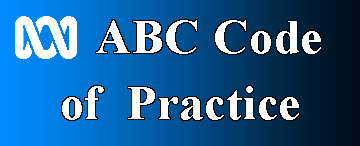

ABC Code of Practice
In Australia, what we call 'the ABC' is a national broadcaster that operates numerous TV and radio stations as well as providing online and streaming resources.
The ABC is 100% funded by taxpayer dollars, so they don't run commercial advertisements and the organisation was set up under a charter that obliges them to present a balanced and fair reporting of current events, and faithfully represent the interests of all Australians. The definitive statement of the ABC's obligations are stated in a code of practice.
* * * * * *
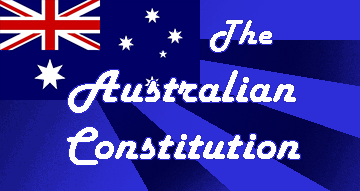

The Australian Constitution
The wording of this presentation of the Australian Constitution is taken from https://www.aph.gov.au/constitution and a printed version purchased from the Australian Government Publishing Service in 2002.
* * * * * *
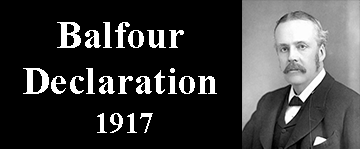

Balfour Declaration
The Balfour Declaration was a public statement issued by the British Government in 1917 announcing its support for the establishment of a "national home for the Jewish people" in Palestine. The declaration was contained in a letter dated 2 November 1917 from the United Kingdom's Foreign Secretary Arthur Balfour to Lord Rothschild, a leader of the British Jewish community.
The term 'national home' is stated as being in Palestine, not superseding it, and not a Jewish homeland as often claimed. It also contains the admonishment that 'nothing shall be done which may prejudice the civil and religious rights of existing non-Jewish communities in Palestine'.
* * * * * *
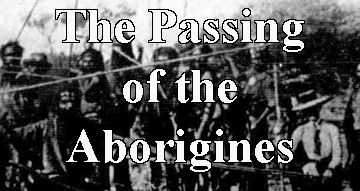

Daisy Bates: The Passing of the Aborigines
Daisy Bates (1863-1951) CBE was an Irish-Australian journalist, welfare worker and self-taught anthropologist who conducted fieldwork amongst several Indigenous nations in western and southern Australia. Bates was a lifelong student of Australian Aboriginal culture and society and was the first anthropologist to carry out a detailed study of Australian Aboriginal culture.
Bates' accounts of Aboriginal culture, were published in the Journal of Agriculture and later by anthropological and geographical societies in Australia and overseas. She published 'The Passing of the Aborigines: A Lifetime spent among the Natives of Australia' in 1938.
Click name to see a complete rendition of The Passing of the Aborigines.
* * * * * *
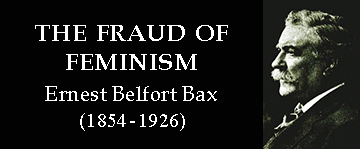

Bax: The Fraud of feminism
Ernest Belfort Bax was an English barrister, journalist, philosopher, men's rights advocate, socialist, and historian.
He was a passionate advocate for the social and legal rights of men, which he saw as lacking in comparison to the legal rights of women.
IB: I have only just started looking at this book. Many of Bax's assertions seem like blasphemy in today's climate of 'political correctness'. But I am interested to see how his claims stand up to examination in the light of modern research and how they may illuminate some of the notions we take for granted today.
* * * * * *
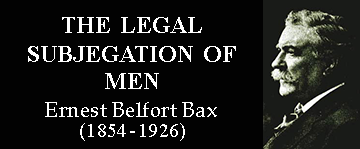

Bax: The Subjection of Men
Originally published in 1896, this pamphlet (64 pages), was written by an unnamed Dublin barrister, but added to and published by Bax.
It contains the fundamental ideas that Bax would later develop in his work 'the Fraud of Feminism' 1908.
* * * * * *
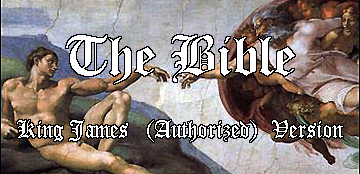

The Bible - the King James version
I am gradually putting up html versions of the books of the old and new testaments found in the King James Authorized Version of the Bible. Eventually each chapter and verse will have an anchor tag enabling specific reference from other pages.
The Bible - the King James version
* * * * * *
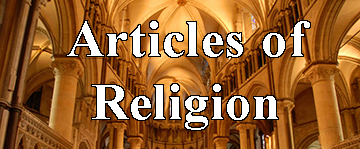

Articles of Religion 1662
This is a copy of the 39 Articles of Religion stated in the Church of England's 'Book of Common Prayer', published in 1662. I have replaced the archaic 'long s', (ſ), with the modern short 's' but otherwise preserved the original spelling.
* * * * * *
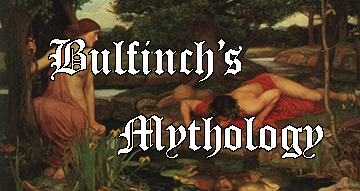

Bulfinch: Bulfinch's Mythology
Thomas Bulfinch 1796 – 1867, was an American writer, best known for the work Bulfinch's Mythology.
Currently I have just put up the first part of this work: Stories of Gods and Heroes. It contains an extensive account of ancient European mythology, especially Greek, written for the layman.
* * * * * *
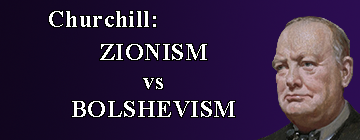

Zionism versus Bolshevism
A struggle for the Soul of the Jewish People
Winston Churchill (1874–1965), published this essay in The Illustrated Sunday Herald (London), February 8, 1920.
Churchill paraises the Jews as 'the most formidable and the most remarkable race which has ever appeared in the world.' They have given us 'in the Christian revelation a system of ethics which ... would be incomparably the most precious possession of mankind.' However, he goes on to say 'this same astounding race may at the present time be in the actual process of producing another system of morals and philosophy, as malevolent as Christianity was benevolent.'
One hundred and four years later, as Israel demolishes Gaza, killing and maiming thousands of women and children, Churchill's words echo as profoundly prophetic.
He goes on to describe three different classes of Jews: 'National Jews' (good citizens of the country in which they live), 'Internationsl Jews' ('adherents of a sinister confederacy' working to overthrow civilization) and 'Terrorist Jews' who created Bolshevism and brought about the Russian Revolution.
This is only a short essay but a fascinating read.
* * * * * *
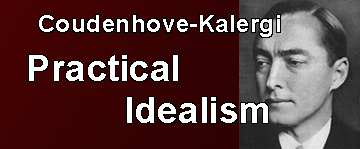

Practical Idealism (1925), by Richard von Coudenhove-Kalergi
Richard von Coudenhove-Kalergi, Count of Coudenhove-Kalergi (1894–1972), was a politician, philosopher, and count of Coudenhove-Kalergi. He was a pioneer of European integration, and served as the founding president of the Paneuropean Union for 49 years.
In this work Kalergi argues that the form of constitution that replaced feudalism and absolutism was democracy. However, the form of government that actually exists is plutocracy—rule by the wealthy. Today, democracy is a façade for plutocracy. Since nations would not tolerate a pure form of plutocracy, they were granted nominal powers, while the real power rests in the hands of plutocrats.
In republican as well as monarchical democracies, the statesmen are puppets, and the capitalists are the puppeteers. They dictate the guidelines of politics, rule through the purchase of the public opinion of the voters, and through professional and social relationships, they rule the ministers.
Instead of the feudal structure of society, the plutocratic stepped in. So now birth is no longer the decisive factor of social rank, but income is. Today's plutocracy is mightier than yesterday's aristocracy, because nobody is above it but the state, which is the tool and helper of the plutocracy.
When there was still true blood nobility, the system of aristocracy by birth was fairer than that of the moneyed aristocracy today, because then the ruling caste had a sense of responsibility, culture and tradition, whereas the class that rules today is barren of feelings of responsibility, culture or tradition.
This is a pdf of the work downloaded from archive.org.
* * * * * *


Ehret: Mucusless-Diet Healing System
Arnold Ehret 1866 – 1922, was a German naturopath and alternative health educator, best known for developing the Mucusless-Diet Healing System. Ehret authored books and articles on dieting, detoxification, fruitarianism, fasting, food combining, health, longevity, naturopathy, physical culture and vitalism.
I first encountered The Mucusless-Diet Healing System in the 1970s, when it was the go-to book on radical vegetarianism.
Whilst some of Ehret's ideas may be misguided, his attitude, that our notions of physical health and body chemistry are often not founded on clear observation or substantiated fact, gives a refreshing look at nutrition, self-healing and bodily health.
Ehret researched the science of 'fasting' in great depth, and the lessons on fasting are essential reading for anyone contemplating doing so.
* * * * * *
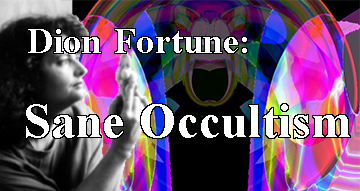

Sane Occultism by Dion Fortune (1890-1946).
Dion Fortune was a British occultist, ceremonial magician, novelist and author. She was a co-founder of the Fraternity of the Inner Light, an occult organisation that promoted philosophies which she claimed had been taught to her by spiritual entities known as the Ascended Masters. In Sane Occultism she is adamant that magic and occult studies, though often dealing with unseen forces, must still be grounded in Reason, and she explains how claims of psychic ability and past lives can, and should, be verified.
* * * * * *
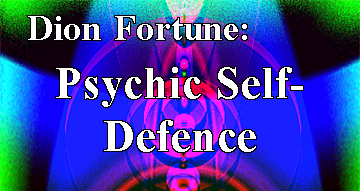

Psychic Self-Defence by Dion Fortune (1890-1946).
Since the Age of Enlightenment (17th century), Western thought has been gripped by the philosophy of Physicalism. Put simply, this philosophy maintains that any form of matter, anti-matter, or energy — anything — that cannot be proved to exist by scientific evidence/demonstration, does not exist. The motto being: 'absence of proof is proof of absence.'
This type of thinking lead to the belief, for thousands of years, that the earth was the stationary centre of the universe and the stars and planets moved around in the sky above it.
If however, you admit the notion that there are all manner of energies and levels of being, that interact with one another, you stand at the threshold of 'esoteric studies' and 'Occultism.'
Fortune was a prolific writer in the field of esoteric knowledge and practice, and the book describes in detail how the interactions of persons and energies can be manipulated by an individual or group, to harm others — initiate a psychic attack.
Fortune explains how to recognise a psychic attack and gives methods an individual can employ, to protect themselves.
It should be noted that Fortune was writing in the late 1920s, before the rediscovery of traditional witchcraft, renamed 'Wicca', (a nature-based religion that has been responsible for much of Western herbal lore). When she uses the term 'witchcraft' she means a type of black magic. It is annoying, but her books are full of this confusion.
* * * * * *
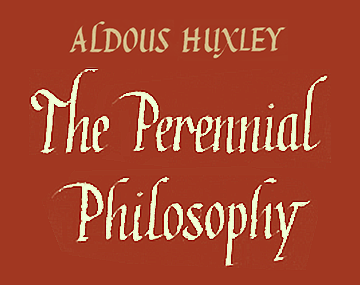

Aldous Huxley: The Perennial Philosophy
Perennial philosophy is a school of thought in philosophy and spirituality which posits that the recurrence of common themes across world religions illuminates universal truths about the nature of reality, humanity, ethics, and consciousness.
In essence, the Perennial philosophy holds that all the world's great religions are metaphorical statements of the same universal energies—they only appear different because they communicate via different metaphorical structures.
Huxley draws from a wide range of resources, many obscure and sidelined by the machinery of the world's major religions.
A masterpiece.
* * * * * *
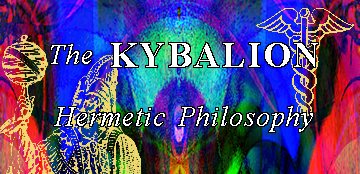

The Kybalion: A Study of the Hermetic Philosophy of Ancient Egypt and Greece.
Reputed to be the teachings of Hermes Trismegistus (Hermetic teachings). Provides a Master-Key for students to understand the fundamentals of esoteric philosophy.
There are seven Hermetic principles, upon which the entire Hermetic philosophy is based:
|
1. The principle of mentalism; 2. The principle of correspondence; 3. The principle of vibration; 4. The principle of polarity; 5. The principle of rhythm; 6. The principle of cause and effect; 7. The principle of gender. |
* * * * * *
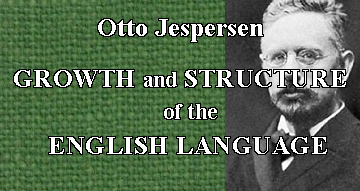

Otto Jespersen: Growth and Structure of the English Language 9th Ed. 1946
Otto Jespersen (1860-1943) was a Danish linguist who specialized in the grammar of the English language. 'Growth and Structure of the English Language' was first published in 1905. The version here is the last edition before Jespersen's death in 1943.
Jespersen traces the evolution of modern English from the Anglo-Saxon settlement, mainly beginning in the 5th century, through the influence of the Danes, the Norman invasion (French influence), and the influence of Latin (mainly through the Roman church).
He paints a picture of a wonderfully adaptable language that has been allowed to develop without the intervention of an authoritarian language academy such as we find in France and Italy.
Growth and Structure of the English Language
* * * * * *
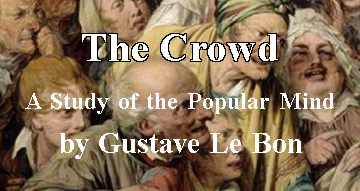

Le Bon: The Crowd (1895)
Gustave Le Bon (1841-1931) was a French polymath whose areas of interest included anthropology, psychology, sociology, medicine, invention, and physics. He is best known for his 1895 work: "The Crowd: A Study of the Popular Mind', which is considered the seminal work on crowd psychology.
'The Crowd' provides a comprehensive analysis of the psychological and sociological characteristics of crowds and their impact on political and social events. It provides valuable insights into the relationship between crowd behavior and the larger political and social context. Le Bon's analysis of the role of crowds in shaping public opinion and political events highlights the importance of understanding the dynamics of crowd behavior in order to better understand broader social and political developments.
Le Bon's discussion of the dangers of crowd mentality and the need for individuals to maintain their sense of individuality within a crowd is particularly pertinent in today's society, where mass movements and popular uprisings are playing an increasingly important role in shaping political change.
* * * * * *
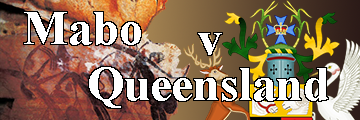

Mabo v Queensland 1992
Mabo v Queensland (No 2) is a decision of the High Court of Australia, decided on 3 June 1992. It is a landmark case, brought by Eddie Mabo against the State of Queensland.
We hear a lot about 'native title' and 'terra nullius', all stemming from this case in the HIgh Court, but few people bother to actually read the published judgements of the 7 High Court judges involved.
In the 18th century, the residents of a land were not considered 'owners' of the land unless they practised agriculture. Uncultivated land was considered to be 'terra nullius', land belonging to no-one. So the legal documents brought to Australia by governor Phillip in 1788, which established the British colony of New South Wales, were correct according to the meaning of terms at the time. The fact that 200 years later, we have different ideas, different meanings, does not automatically make those old documents invalid.
In any case, the Mabo case was not about Aboriginal Australia, it was about the Muray Islands which were annexed by Queensland in 1878. This action was motivated by a desire to restore order to those islands and protect the islanders from 'blackbirding.' They were never considered 'terra nullius' as the islanders were traditional gardeners with a strong tradition of land ownership.
The High Court's online publication of the Mabo judgement(s), some 90,000 words, (link), is barely readable (formatting errors etc.). However, the various judgements contain some marvellous legal arguments with precedent material going back to the 14th century.
Here is a suitably formatted online copy. I have added a basic 'Table of Contents' so you can jump to the beginning of the various judgements.
* * * * * *
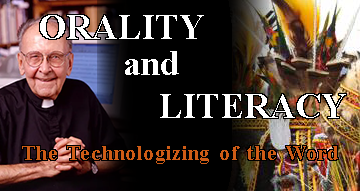

Walter Jackson Ong, (November 30, 1912 – August 12, 2003), was an American Jesuit priest, professor of English literature, cultural and religious historian, and philosopher. His major interest was in exploring how the transition from orality to literacy influenced culture and changed human consciousness.
In Orality and Literacy, (1982), he attempts to identify the distinguishing characteristics of orality by examining thought and its verbal expression in societies where the technologies of literacy (especially writing and print) are unfamiliar to most of the population.
The changes in consciousness brought about by gaining literacy are profound and near impossible for a literate person to appreciate. Literate people tend to think of language as what is written, however this is not so. Writing is a secondary modelling system that cannot exist without the primary reality which is spoken language.
Once we become accustomed to reading, our concept of words move from the 4-D world of sound to the 2-D visual arena of the printed page. This tends to lend an orthodoxy to visual perception and left-brain activity.
The psychodynamic changes Ong observed between societies with no writing (oral societies) and those with writing are extensive. (See article.)
Ong's work is brilliant, and explains many of the thought and consciousness problems plaguing modern (literate) societies. However, his work is largely neglected by academia, because, by definition, academics are super-literate, and incapable of appreciating the differences in thought and consciousness literacy has effected in them.
* * * * * *


George Orwell: 1984
Published in 1949, Orwell's '1984' has been considered a 'futurist' novel that did not come about. However, if it did 'come about' we would be saying the same thing. Orwell was writing about movements in contemporary life, many of which have continued to develop. The similarities between Orwell's 'Newspeak' and the modern language of 'Political Correctness' cannot be denied.
This is what I call a 'fair rendition' of the text into an html document.
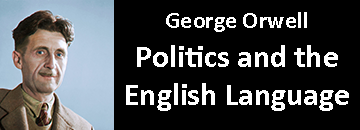

George Orwell: Politics and the Englisn Language
An essay published in 1946 which decries the rampant use of jaded expressions and tired clichés in contemporary English usage.
George Orwell: Politics and the Englisn Language
* * * * * *
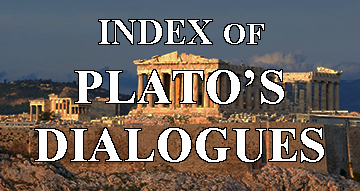

Plato
Plato c.424 – c.348 BC was an Athenian philosopher during the Classical period in Ancient Greece. He founded the Platonist school of thought and the Academy, the first institution of higher learning in the Western world.
He is widely considered the pivotal figure in the history of Ancient Greek and Western philosophy, along with his teacher, Socrates, and his most famous student, Aristotle. I tend to agree with the saying of Alfred North Whitehead: 'all of Western Philosophy is little more than a footnote to Plato'.
I will gradually put up html versions of the dialogues here with each paragraph given a numbered html anchor, to enable direct and focussed referencing from other pages.
* * * * * *


The Universal Declaration of Human Rights (UDHR) was accepted by the United Nations General Assembly as Resolution 217 during its third session on 10 December 1948 at the Palais de Chaillot in Paris, France. Of the 58 members of the United Nations at the time, 48 voted in favour, none against, eight abstained (the U.S.S.R., the Ukraine, Byelorussia, Poland, Czechoslovakia, Yugoslavia, Saudi Arabia, and the Union of South Africa), and two did not vote.
It is an international document that enshrines the rights and freedoms of all human beings. Drafted by a UN committee chaired by Eleanor Roosevelt, it is accepted as the foundational text in the history of human and civil rights.
The Declaration consists of 30 articles detailing an individual's "basic rights and fundamental freedoms" and affirming their universal character as inherent, inalienable, and applicable to all human beings.
It directly inspired the development of international human rights law, and was the first step in the formulation of the International Bill of Human Rights, which was completed in 1966 and came into force in 1976. Although not legally binding, the contents of the UDHR have been elaborated and incorporated into subsequent international treaties, regional human rights instruments, and national constitutions and legal codes.
While there is a wide consensus that the declaration itself is non-binding and not part of customary international law, there is also a consensus that many of its provisions are binding and have passed into customary international law, although courts in some nations have been more restrictive on its legal effect.
The Declaration consists of the following:
Universal Declaration of Human Rights
* * * * * *
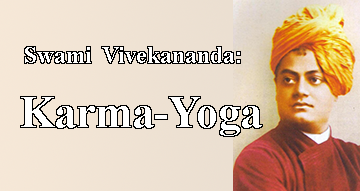

Swami Vivekananda: Karma-Yoga (1884-1937)
Swami Vivekananda, born Narendranath Datta, was an Indian Hindu monk, philosopher, author, religious teacher, and the chief disciple of the Indian mystic Ramakrishna. He was a key figure in the introduction of Vedanta and Yoga to the Western world, and is considered to be the father of modern Indian nationalism who is credited with raising interfaith awareness and bringing Hinduism to the status of a major world religion.
A brilliant scholar and prodigious reader, Vivekananda was inclined from a young age towards religion and spirituality. He promoted the notion of universal toleration and acceptance of all religions as true.
Travelling and lecturing in America and Europe, he adapted traditional Hindu ideas and religiosity to suit the needs and understandings of his western audiences, accommodating western esoteric traditions.
Vivekananda believed that the Absolute is both immanent and transcendent:
"Each soul is potentially divine. The goal is to manifest this Divinity within by controlling nature, external and internal. Do this either by work, or worship, or mental discipline, or philosophy—by one, or more, or all of these—and be free. This is the whole of religion. Doctrines, or dogmas, or rituals, or books, or temples, or forms, are but secondary details."
An important element in his adaptation of Hindu religiosity was the introduction of his four yoga's model, which includes Raja yoga, his interpretation of Patanjali's Yoga sutras,[200] which offered a practical means to realise the divine force within which is central to modern Western esotericism.[20
Most of his published works were compiled from lectures given around the world which were mainly delivered impromptu and with little preparation. 'Karma Yoga' is one of 5 books derived from stenographic transcriptions of lectures delivered in New York in 1895-96.
* * * * * *
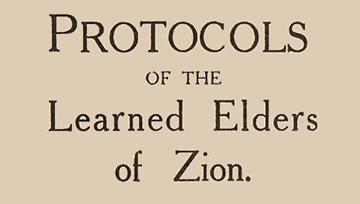

The 'Protocols of the Learned Elders of Zion' was originally published in Russia in 1903 by Pavel Krushevan. It is purported to be a fabrication, plagiarized from several earlier sources.
It details a Jewish plot for global domination.
Whilst this work is most probably a huge anti-semitic fiction, it seems to outline the playbook that has been followed in the founding and continuence of Israel, and the subjugation of the most powerful country in the world to support a Zionist agenda.
Protocols of the Learned Elders of Zion
* * * * * *
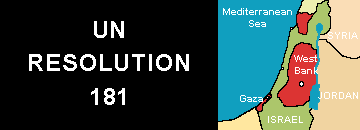

In November 1947 the UN General Assembly passed resolution 181 (II), which partitioned Palestine into two independent but economically linked States, one Arab and one Jewish, with Jerusalem placed under a special international regime.
The Arab state was to have a territory of 11,592 square kilometres, or 42.88 percent of the Mandate's territory, and the Jewish state a territory of 15,264 square kilometres, or 56.47 percent; the remaining 0.65 percent or 176 square kilometres—comprising Jerusalem, Bethlehem and the adjoining area—would become an international zone.
The resolution makes no attempt to define the terms 'Jewish' or 'Arab', but it makes clear that the citizenry of each state would comprise both Arabs and Jews with full and equal rights including freedom of religion and voting rights for women.
UN Resolution 181 (II) Nov. 1947
* * * * * *


Yevgeny Zamiatin: We
Yevgeny Zamiatin (1884-1937). Became a member of the Bolshevik's Pre-Revolutionary underground at an early age. However, after the October Revolution he became deeply disturbed by the policies pursued by the All-Union Communist Party. He subsequently used literature to both satirize and criticize the Soviet Union's enforced conformity and increasing totalitarianism.
'We' (written between 1920 and 1921), is set many centuries in the future, in One State, an urban society constructed almost entirely of glass apartment-buildings, which assist mass surveillance by the secret police. The structure of the One State is Panopticon-like, and life is scientifically managed based on the theories of W. Taylor. People march in step with each other and are uniformed. There is no way of referring to people except by numbers assigned by the One State. The society is run strictly by logic or reason as the primary justification for the laws or the construct of the society. The individual's behaviour is based on logic by way of formulas and equations outlined by the One State.
* * * * * *
QUOTES AND SUMMARIES OF BOOKS
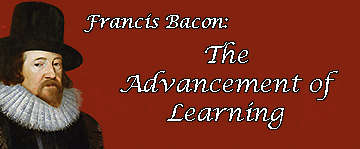

Francis Bacon: The Advancement of Learning
In 1605, Francis Bacon published 'Of the Proficience and Advancement of Learning, Divine and Human'. A survey of the fields of human knowledge, the state of achievement and the impediments to progress in each field.
This is my selection of memorable quotes from 'The Advancement' with a few comments.
Francis Bacon: The Advancement of Learning
* * * * * *


'The Power of Myth' by Joseph Campbell
Joseph Campbell (1904-87), holder of the Joseph Campbell Chair in Comparative Mythology at Sarah Lawrence College (New York) for almost forty years.
Campbell: quotes from 'The Power of Myth'
* * * * * *
COLLECTIONS OF ITEMS AND RESOURCES
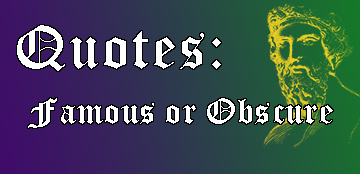

Quotes from various sources, worthy of remembering and studying.
* * * * * *
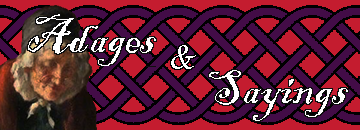

A Collection of Adages and Sayings.
There is a lot of wisdom in the corpus of adages and sayings that we seem to inherit in our memory along with our native English. So I have set about collecting a list of them. This also includes some famous quotes that have entered the language as stock phrases.
I will gradually add comments and origin information.
A Collection of Adages and Sayings.
* * * * * *
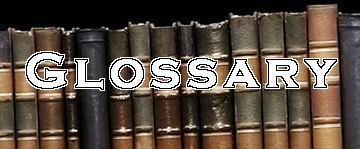

Glossary
A glossary of significant words and terms used in the Wordwise web pages, with definitions, explanations and examples. This file will be under continual development.
* * * * * *


Reference Text Extracts
Copyright is a complex field, and not every document available freely on the net is in the public domain.
Whilst I take every care to make sure that all complete documents that are made available through this site are in the public domain, many documents I wish to refer to (for reference & critical purposes) are covered by copyright. So, I will list selected quotes from those documents here, in the hope that firstly, the buying public are informed of the quality and desirability of owning a copy of the quoted documents, and secondly, the benefit to public discourse offered through these publications is made widely available.
* * * * * *
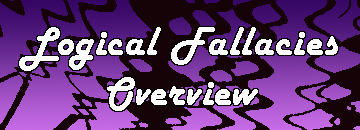

An Overview of Logical Fallacies
It is difficult for the average person to notice when an argument or a seemingly rational proposition is logically correct or not. Often all a person has to go on is common sense or perhaps a 'gut' feeling.
This article is an introduction to logic and what are considered to be fallacies of logic. Some may seem obvious (by the common sense test) but others may be difficult to spot.
* * * * * *
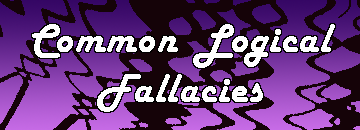

Common Logical Fallacies
This is a list of the most common logical fallacies you are likely to come across.
* * * * * *
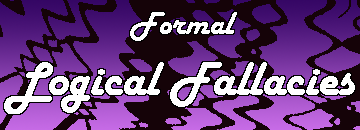

Formal Logical Fallacies
Formal fallacies are arguments that follow an invalid argument form. Even if the premises are true, the argument form does not establish the necessary truth of the conclusion.
* * * * * *
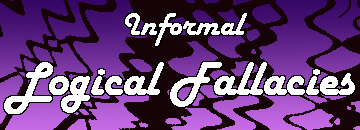

Informal Logical Fallacies
Informal fallacies are arguments that follow valid logical forms but do not lead to conclusions that are necessarily true. The source of their ‘unsoundness’ lies in the argument's content.
* * * * * *


Rhetorical devices
Rhetoric is the art of persuasive speaking or writing. It uses ‘rhetorical devices’ to appeal to various sensibilities of the audience to persuade them to accept and agree with the speaker’s or writer’s point of view. This page contains a list of common rhetorical devices, listed alphabetically.
* * * * * *
Wikipedia: Two Dogmas of Empiricism